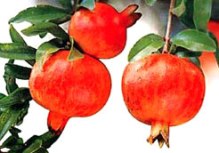"Before you gulp down that eggnog or spicy apple cider this holiday season, take a moment to consider what your drink can do for your brain. If you opt for a glass of pomegranate juice, you may be staving off Alzheimer's disease", says Dr. Richard Harman, lead researcher and author of a study released last month by U.S. based Loma Linda University (LLU) in collaboration with Washington University researchers.
"This study is the first to show beneficial effects (both behavioral and neuropathological) of pomegranate juice in an animal model of Alzheimer’s disease," says Richard Hartman, PhD, researcher and lead author of the study, and assistant professor of psychology in the School of Science and Technology, LLU. Dr. Hartman collaborated with Washington University researchers on this project.
It reveals that pomegranates, when compared to other fruits and vegetables, pack notably high levels of polyphenols. According to researchers, Polyphenols are one of many antioxidants known to neutralize the harmful effects of free radicals, which attack healthy human cells and cause them to mutate into cancer cells. Free radicals have also been linked to triggering arthritis, atherosclerosis, diabetes, premature aging, and Alzheimer's disease.
For years, pomegranates have been linked to curbing certain types of cancer and clearing arteries. Hartman's study indicates they're as good for your brain as they are for your heart.
At Loma Linda University, a Seventh-day Adventist Health Sciences Institution in California, Hartman and other researchers used mice with genetic tendencies to develop Alzheimer's-like diseases. Researchers divided the mice into two groups. The first drank water with added pomegranate juice concentrate, while the remainder drank water with added sugar equal to the natural sweetness of the juice.
Six months later, the study mice that consumed pomegranate juice learned more quickly and swam measurably faster during underwater maze tests of their learning and memory abilities than the mice that drank sugar water. They also had 50 percent less plaque in their brains.
Hartman explains that brain plaques are "toxic clumps of protein" accumulated in the brain. These accumulations, he says, damage and disrupt communication between brain cells. Compromised brain cells trigger memory loss and cognitive decline--both characteristic signs of Alzheimer's disease.
Each of the mice in the study drank an average of 5 milliliters of pomegranate juice a day. To reap similar benefits, researchers project, humans should aim for 1-2 glasses per day.
"There's no evidence that it's an 'all or none' situation," says Hartman, so even a glass of pomegranate juice every now and then may prove beneficial. However, he encourages everyone to drink the recommended amount.
Dr. Allan Handysides, director of health ministries at Adventist world church headquarters, adds that research involving laboratory animals does not always translate directly to humans. "I don't decry the study," he says. "It's very exciting, but it has to be taken, as do all studies in laboratories, as a preliminary opening to continued research, rather than conclusive proof in itself."
While pomegranate juice is a bit pricy when compared to, say, orange or grape juice, Hartman believes it's well worth the price. "Medications for Alzheimer's disease, cancer and heart disease are significantly more expensive, and as they say, an ounce of prevention is worth a pound of cure." He adds that some groceries offer the juice in an affordable organic concentrate form.
This study, titled "Pomegranate juice decreases amyloid load and improves behavior in a mouse model of Alzheimer’s disease," is featured in the December 2006 journal of Neurobiology of Disease. The full research article is available.


